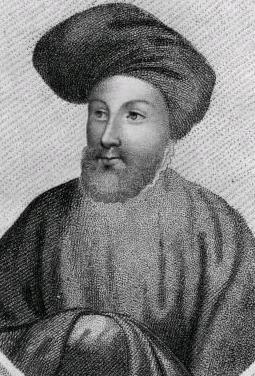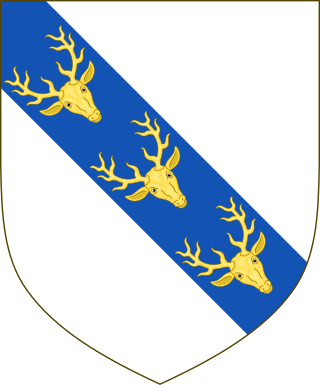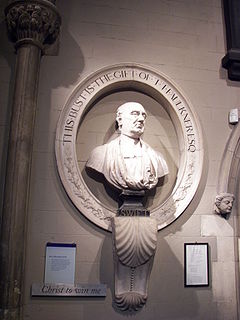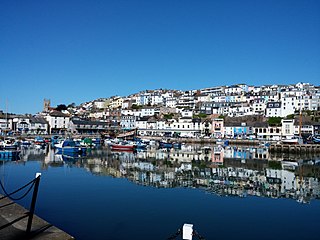John de Gray or de Grey was an English prelate who served as Bishop of Norwich, and was elected but unconfirmed Archbishop of Canterbury. He was employed in the service of Prince John even before John became king, for which he was rewarded with a number of ecclesiastical offices, culminating in his pro forma election to Norwich in 1200. De Gray continued in royal service after his elevation to the episcopate, lending the King money and undertaking diplomatic missions on his behalf. In 1205 King John attempted to further reward de Gray with a translation to the archbishopric of Canterbury, but a disputed election process led to de Gray's selection being quashed by Pope Innocent III in 1206.

Edward, 2nd Duke of York, was an English nobleman, military commander and magnate. He was the eldest son of Edmund of Langley, 1st Duke of York, and a grandson of King Edward III of England. He held significant appointments during the reigns of Richard II, Henry IV, and Henry V, and is also known for his translation of the hunting treatise The Master of Game. He was killed in 1415 at the Battle of Agincourt, whilst commanding the right wing of the English army.
John Holland, 1st Duke of Exeter, 1st Earl of Huntingdon, KG, of Dartington Hall in Devon, was a half-brother of King Richard II (1377–1399), to whom he remained strongly loyal. He is primarily remembered for being suspected of assisting in the downfall of King Richard's uncle Thomas of Woodstock, 1st Duke of Gloucester (1355–1397) and then for conspiring against King Richard's first cousin and eventual deposer, Henry Bolingbroke, later King Henry IV (1399–1413).

Sir John Stanley, KG of Lathom, near Ormskirk in Lancashire, was Lord Lieutenant of Ireland and titular King of Mann, the first of that name. He married a wealthy heiress, Isabel Lathom, which, combined with his own great abilities, allowed him to rise above the usual status of a younger son.

The Dean of St Patrick's Cathedral is the senior cleric of the Protestant St Patrick's Cathedral, Dublin, elected by the chapter of the cathedral. The office was created in 1219 or 1220, by one of several charters granted to the cathedral by Archbishop Henry de Loundres between 1218 and 1220.

John Waltham was a priest and high-ranking government official in England in the 14th century. He held a number of ecclesiastical and civic positions during the reigns of King Edward III and Richard II, eventually rising to become Lord High Treasurer, Lord Privy Seal of England and Bishop of Salisbury. He is buried in Westminster Abbey, London.
William Ayermin was a medieval Bishop of Norwich.
Sir William Hankford KB of Annery in Devon, was an English lawyer, and Chief Justice of the King's Bench from 1413 until 1423.
Richard Northalis was an English-born cleric and judge who spent much of his life in Ireland. He held the offices of Bishop of Ossory, Archbishop of Dublin and Lord Chancellor of Ireland. For the last decade of his life, he was one of the English Crown's most trusted advisers on Irish affairs.
Nicholas de Balscote was an English-born official and judge in fourteenth-century Ireland. He attained high judicial office, but his career was damaged by a quarrel with King Edward II.
Robert Sutton was an Irish judge and Crown official. During a career which lasted almost 60 years he served the English Crown in a variety of offices, notably as Deputy to the Lord Chancellor of Ireland, Chief Baron of the Irish Exchequer, Master of the Rolls in Ireland, and Deputy Treasurer of Ireland. A warrant dated 1423 praised him for his "long and laudable" service to the Crown.

Thomas de Everdon (c.1320–1413) was an English-born cleric and judge, who was a trusted Crown official in Ireland for several decades.
William de Karlell was an English-born judge, administrator and cleric in fourteenth-century Ireland. He held numerous benefices including Archdeacon of Meath and Rector of Youghal, and sat in the Irish House of Commons. After sitting for some years as a Baron of the Court of Exchequer (Ireland) he was removed from office, following a flood of complaints about his numerous acts of extortion and oppression, but he was later restored to favour, and served briefly as Chief Baron of the Irish Exchequer. He is buried in St Canice's Cathedral, Kilkenny.
John Tirel, or Tyrell was a prominent judge and statesman in fourteenth-century Ireland who held office as Serjeant-at-law and Chief Justice of the Irish Common Pleas.
Peter Rowe was an Irish judge who held the office of Lord Chief Justice of Ireland intermittently between 1388 and 1397.

William de Whithurst was an English Crown official, who held office as a judge in Ireland.

Thomas Bache was an Anglo-Italian cleric and judge who held high office in Ireland in the later fourteenth and early fifteenth centuries. He served one term as Lord High Treasurer of Ireland and three terms as Chief Baron of the Irish Exchequer.
Robert Dyke, Dyck or Dyche was an English-born cleric and judge who held high office in fifteenth-century Ireland. He was appointed to the offices of Archdeacon of Dublin, Chancellor of the Exchequer of Ireland, Lord High Treasurer of Ireland, and Master of the Rolls in Ireland, as well as holding several Church livings.
Robert de Faryngton, or de Farrington was an English-born cleric, judge and statesman who became Lord High Treasurer of Ireland. As a cleric, he was notorious for pluralism, but he enjoyed the trust of three successive English monarchs.
Sir John Russell, of Strensham in Worcestershire where he held the manor and advowson, was an English landowner, soldier, administrator, courtier and politician.